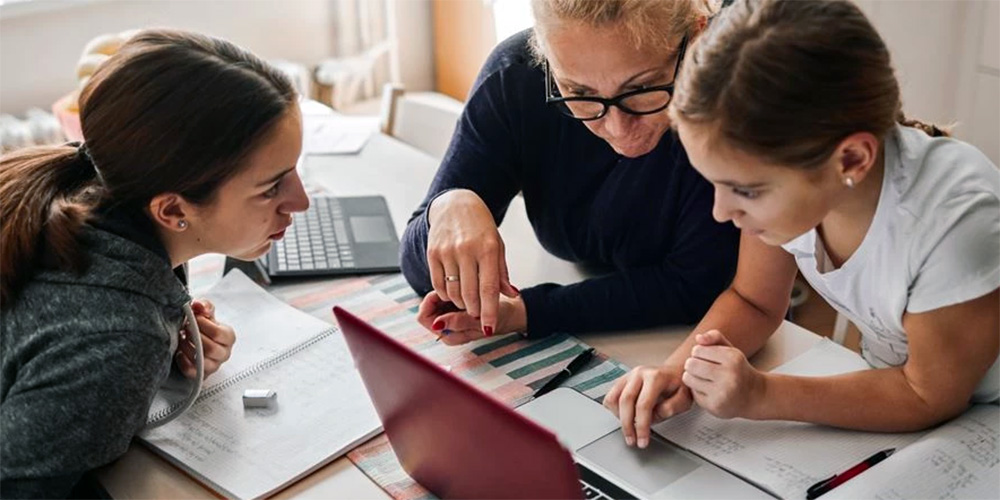
Ultimate guide to: Keeping children safe online
Keeping children safe and secure online is challenging. Read our guide to find some practical tips which you can use to keep kids safe.
04 March 2022
The rapid growth of affordable high speed broadband and the increase in availability of internet connected devices has created many new opportunities, particularly for children who are growing up as digital natives. As parents we want nothing more than to keep our children safe – especially when they’re online. But how do we do it in an environment that’s changed dramatically from the internet we had growing up?
In this blog we’re going to look at how you can grow your confidence to help you to keep your kids safe online.

Importance of online safety for children
According to Ofcom, in 2020, nearly all children aged 5-15 went online. Laptops, tablets and mobiles were the most used devices for going online, used by seven in ten of these children.
The way children access and consume information has evolved. Even traditional pursuits like watching television has changed, with 67% now exclusively watching streamed media over traditional broadcast. The way children communicate and play has evolved too, let’s take a closer look at what the Ofcom report tells us our children are using their devices for:
- Social media: the minimum age for social media accounts like Facebook, TikTok and Instagram is 13, but many children have an account earlier than this. 30% of children aged 5-7 are already using social media apps to share pictures, stories and thoughts
- Streaming: 91% of children are watching video-on-demand content which includes videos on YouTube, and films and TV shows found on streaming services such as Disney+ and BBC iPlayer
- Gaming: around 7 in 10 children in the UK play video games on a games console; almost 6 in 10 children use a mobile device, like a smartphone or tablet; and around 4 in 10 children use a laptop, desktop or specialised gaming computers to play games. Video games can be played online alone, or with family and friends, and gamers can communicate with other players through live chat or messaging to talk strategies and game tactics, or just for a general chat
- Education: children can use the internet to get help with their homework much more easily than having to go to the public library. The internet gives your child instant access to thousands of resources to help them with their studies. Their school might even have an online portal for them to use to get their homework and project work handed in
- Communication: children can ‘chat’ to other people in a variety of ways online by sending messages using in-game chat functions, messaging apps and social media posts.

Risks of children using the internet
As parents, it’s important that we understand some of the risks of using the internet before we can educate our children to stay safe online including:
Oversharing: Whilst online, children are able to communicate using text or voice in a number of different ways. This helps them to remain connected to friends and family, but it is also a method exploited by criminals to groom children. Sharing too much of their personal information, either when communicating or posting pictures or videos, is a big risk of children being online.
Online reputation: If your child has a social media account, they need to understand that once posted, their comments and pictures are viewable online and can remain there forever. Things posted now can affect future university or job applications. Learning what to share and how to conduct yourself online is a big part of responsible internet usage.
Spending pressure: children today are targeted by lots of different advertising techniques including TV adverts, social media adverts, and in-game sales tactics. As well as games attempting to drive spending, there’s also often outside pressures from friends or online personalities encouraging children to have the latest toy, game content or fashion accessory.
Depending on your device’s operating system, you may be able to set restrictions on the apps your child can download and whether they can make in-app purchases.
Inappropriate content: Unsupervised or uncontrolled access to the internet poses the risk of children seeing or being exposed to content inappropriate for their age. Pornography, depictions of violence and adult themes can be easily available to children where appropriate measures have not been put in place to prevent it.
Account hacks: Password security is a very important thing for children to learn. Due to the large sums of money being spent on games and in game content, children’s accounts are valuable to hackers. They could hack into your child’s account and change all of the security details before selling the account on. Social media accounts can also be stolen and used to make other scams seem more legitimate, by impersonating children in their existing network.

Fake news and scams: Often this is achieved by the use of elaborate and believable scams targeted at children. Many of these promise additional free items or content for their favourite games and then phish for account details and passwords. The first a child could be aware of a problem is when they can no longer sign in. Children are also often targeted by criminal organisations and tricked into becoming money mules. They can be asked to receive and transfer money for criminals in return for a financial reward.
It’s sometimes tricky for adults to spot fake news or misinformation online. Children are even more vulnerable to believing things they see or hear while on social media or clicking links to third party websites. Knowing how to identify trusted information sources can help you and your child avoid spreading fake news or embarrassing yourselves in front of friends and family
Content overload: This in part can lead to a content overload for children. With there being so much readily available information, video on demand, online gaming etc. children can find that they are not making time for other things. It is really important for their wider development to strike a balance and schedule some digital downtime as a family.
Cyber bullying: Bullying is a widespread issue for children. However, the internet has created a new type of bullying known as cyber bullying. This type of bullying can take many forms, from nasty comments or videos posted on social media, to preventing a child from joining in an online game. A problem with cyber bullying is that it may not be as visible as other types of bullying and it also affects a child wherever they go. It’s important that you have a conversation with your child and ensure they can talk to you about anything which makes them feel uncomfortable.

Top tips to keep kids safe online
By understanding and being aware of the risks, we can prepare our children for the online world and help to reduce the chances of them being victim to any of the dangers being online brings, freeing them up for experiencing the benefits that safe internet use can bring.
Here are our top tips:
1. Talk to them about online safety and security
It could also be beneficial to spend time online with your child - playing video games together can be a great way to have fun as a family, and it might even help boost family communication.
If children are given the impression that we aren’t interested in what they are doing (or only interested when we think there is a problem) then they’ll be unlikely to offer information about what they’re up to, or involve us in discussions. Equally, having some understanding of the game and what it entails will help parents to give a more appropriate and balanced response if and when something goes wrong.
A big part of internet safety for children is to help them develop their own skills to avoid potentially dangerous or damaging content and situations.
You might be wondering ‘how do I talk to my child about online safety?’ You’re not alone, fortunately, Internet Matters have lots of resources and guides to help you talk to your child about online safety, including how to block and report inappropriate content, the importance of having secure passwords, and the dangers of oversharing personal information.
2. Use parental controls
Almost six in ten parents questioned in the Ofcom report were aware of parental controls built into their devices (consoles, computers and smartphones etc.) by the manufacturer, but only 32% said they used them.
If your child has a device, it’s important to check out the parental control options available straight away. This ensures that you have established some safer parameters in which your children will be able to interact. This could include providing access through Google safe search or restricting viewing to YouTube Kids. This will help to prevent the accidental viewing of inappropriate material as often even innocent seeming searches can lead to unexpected results.
Most of the popular gaming consoles, social media sites and digital devices have guides for use – including parental controls. Internet Matters have compiled a comprehensive list of parental controls, with simple step by step guides to help you get them set up.

3. Monitor their screens
Internet devices have become smaller and more portable making them much easier to transport and to use. A consequence of this is that they are also more easy to keep secrets with. Setting the right rules and having the right relationship of openness and honesty with your children is essential.
Whilst it is possible to view their internet browsing history and review conversations they have been having, if children are smart or are being coached by a third party, it’s relatively easy to hide or delete some or all of this data. A total wipe might be obvious if you looked, but would you spot a deleted message or a few minutes of missing browsing data? It’s far better to encourage children to keep their devices and internet use obvious in family rooms, regularly checking what they’re doing and who they’re talking to.
A culture of openness will help you spot if their behaviour is changing or they are becoming reluctant to tell you who they are talking to or what they are doing online.
4. Keep track of their online time
From Ofcom research we know that children aged 3 – 15 spend between 6 – 13 hours per week playing video games, and as children get older, this increases.
There have been a number of studies on the impact of screen time on children’s wellbeing which have shown that screen time is on the whole beneficial for children in moderation. Both the UK Government and the RCPCH (Royal College of Paediatrics and Child Health) have released advice to help parents manage the time their child spend online, highlighting the need to negotiate screen time limits with children based upon the needs of an individual child.
Working together with your child to establish limits on time spent online can be a good way for them to respect the boundaries you set. Also, taking time to review these limits periodically based on the impact on their commitments offline (i.e. homework) is key to make sure it's still working for your child.
You might want consider creating a ‘Family Agreement’ for device and online rules. It’s something that can be done with your whole family, regardless of age. By getting your children involved in setting the terms for the agreement, they’re more likely to stick to them, plus you and other responsible adults in the household can set an example. It’s a good opportunity to talk to your child about what they’re doing online, how long they think is an acceptable time to spend on their devices, and letting them know that you’re there to support them.
UK Safer Internet Centre has created a Family Agreement template and some guidance for terms you might want to add, including things like where phones are allowed to be used in the house, and what apps can be downloaded.

5. Set a great example
If you want your children to be safe online it is best to start, as with other behaviours, by setting a good example yourself. Younger children are more likely to sit close to their parents and a good example of internet safety from an early age will lead to a better understanding as they grow up.
Once you’ve started this process then you can use this as a teaching opportunity to share other digital tips such as how to ensure your applications are kept up to date, how to customise your settings and how to report inappropriate content etc.
6. Teach kids to beware
Just as we teach children to be aware of strangers in the real world, we should ensure that they are stranger safe online. Unexpected messages, offers of gifts or other freebies should be treated with the same suspicion online or in games as they would be in the street or at the park. Nobody gives anything away for nothing and it’s better to say no than to regret things later.

We’ve looked at how beneficial access to the internet is to children and come to understand that it’s easier than ever for them to have access, but also how this access has led to a new wave of risks that we may not have faced ourselves.
As parents we must lead the way in demonstrating healthy and responsible usage of the internet as well as imparting those top tips to stay safe online. If we role model behaviours in the first instance our message around safety and security won’t fall on deaf ears.
This document is an independent publication and is neither affiliated with, nor authorised, sponsored, or approved by any of the brands mentioned within it. All trademarks are the property of their respective owners. There are other services available and Barclays does not specifically endorse or recommend the use of the services mentioned in this document.

